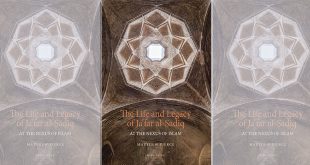During this month of sentimental and religious value, Muslim people pay great attention to praying, having nice meals with loved ones to increase the feeling of unity, solidarity and philanthropy in addition to fasting from dawn to dusk.
The spiritual zeal of the holy month of Ramadan has already begun all around the world, including in Kashmir. During this month of sentimental and religious value, Muslim people pay great attention to praying, having nice meals with loved ones to increase the feeling of unity, solidarity and philanthropy in addition to fasting from dawn to dusk.
The month of Ramadan has its own unique charm, and its arrival is widely celebrated. In Kashmir, the very first indicator is the emptiness of streets ordinarily overcrowded with date sellers, fruit sellers, bakers and other street vendors. This, however, is not just because people do not eat or drink between sun up and sundown. Ramadan is a time to slow down, reset and, most importantly, nurture and support your spirit for self-reflection and contemplation. Thus, working hours are shorter, enabling people to devote time to prayers and spiritual meditation in most Islamic countries.
However, these are not all of the observances of Ramadan in Kashmir. Let us take a quick peek at the region to learn more about how Kashmiris observe the blessed month with great fervor.
During Ramadan in Kashmir, sahur (the pre-dawn meal) begins with the sound of drummers who roam the streets in the predawn darkness, performing with their melodious voices. The sahur-time drumming is actually a centuries-old practice still carried out in the Kashmiri valley. These drummers can be considered human alarm clocks who wake Kashmiris up for predawn meals, commonly called “sehri” in the local dialect. In the early hours, the clarion voices of the drummers reach to the ears of the faithful, calling “waqt-e-saha,” meaning “it’s time for sahur.”
Fasting and feasting
The people of Kashmir, unlike the rest of India, have somewhat distinctive eating habits and tend to consume more healthy and energetic meals in general. Taking a suitable portion of food that is healthy and nutritious is one of the most important things to remember during Ramadan for all Muslims.
In predawn meals, people consume rice or chapatis (an unleavened flatbread) with wonderful vegetarian and non-vegetarian delicacies generally followed by homemade fresh curd.
Kashmiri traditional bakeries include a wide variety of baked goods, such as “lavasa” (a lighter version of bread), “gheyv czhot” (soft yet solid bread prepared with ghee), “shirmal” (flat milk bread sprinkled with poppy seeds), “katlam” (a flaky and deep-fried bread), “tchvoar” (a crispy bread sprinkled with sesame seeds), “kulcha” (a crispy and round-shaped bread sprinkled with poppy seeds) and “bakirkhani” (ghee-soaked puff pastry). Traditional Kashmiri bakeries continue to tickle the taste buds of the locals during the month of Ramadan. Therefore, one generally prefers to drink a salty tea called “noon chai” with pieces of special bread on the side after meals.
After a long day of fasting, iftar (the evening fast-breaking meal) comes. Many Kashmiri people prefer to break their fast by eating a couple of fresh dates, while some consume drinks made from basil seeds immersed in water mixed with sugar and some milk. The drink is commonly called “babribeoul treish” and offers significant health benefits like suppressing appetite, reducing stress, curing gastrointestinal tract issues and relieving constipation. Besides being loaded with calcium, protein, iron, magnesium, potassium, vitamins and some fiber, it has a cooling effect and keeps one’s body hydrated for hours.
Other varieties of cuisines include phirni, custard and fruit chats (fruit salads) followed by proper meals. Phirni is a famous Kashmiri dessert made from semolina, milk, some sugar and a few green cardamom pods garnished with dry fruit or coconut powder.
Post-iftar meals also turn into extravagant feasts after men return from the mosque after evening prayers (maghrib prayers). At this point, I should also mention that during the coronavirus pandemic, people hardly participated in any congressional prayers or religious sermons and were confined to their homes.
After iftar, numerous varieties of dishes are also served, including rice, mutton curries, yogurt, salad and pickles.
Celebrations
In addition to fasting and feasting, people pray and give both voluntary and obligatory forms of a charity called zakat to poor people during Ramadan. As charity is one of the pillars of the Islamic faith, Kashmiris are already known for their hospitality and help for the needy throughout India.
Muslims utilize this sacred month to get physically, morally and spiritually purified. Apart from eating restrictions during the day, they also refrain from all worldly habits like smoking, gossiping, arguing and lying. The holy month of Ramadan is known as the month of revelation or guidance that teaches us self-restraint, brotherhood, inspiration, empathy and sacrifice as it was the month of Ramadan when the first verse of the Holy Quran was revealed to the Prophet Muhammad. The Quran was first sent down as guidance for the whole of humankind, carrying clear proof of divine guidance and a benchmark for right and wrong.
The month of Ramadan is followed by Ramadan Bayram, also known as Eid al-Fitr. Marking the end of the holy month, this festival starts with shopping for different varieties of confectionary, mutton, sweets, new garments, shoes and toys for children in Kashmir. It is a tradition to wear new clothes, eat something sweet such as a date and recite a small prayer. Locals normally celebrate the festival at home with great exuberance by exchanging greetings and feasting with their families. Despite the deadly coronavirus pandemic, the people of Kashmir have been diligently keeping their traditions and religious obligations alive.
source:dailysabah
 Ijtihad Network Being Wise and Faithful Muslim in the Contemporary World
Ijtihad Network Being Wise and Faithful Muslim in the Contemporary World
